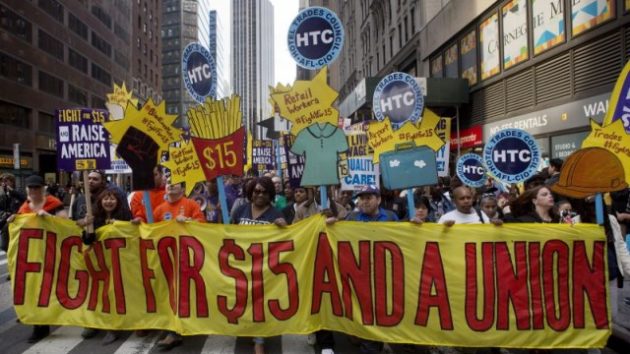Los Angeles Shows Us the Real Reason Why Unions are Pushing for Minimum Wage Increases
Unions like the SEIU have spent millions funding “worker centers” that stage “grassroots,” “Fight for $15” minimum wage protests.
In Los Angeles, they scored a win. However, unions want to be exempted from the wage hike:
Labor leaders, who were among the strongest supporters of the citywide minimum wage increase approved last week by the Los Angeles City Council, are advocating last-minute changes to the law that could create an exemption for companies with unionized workforces.
The push to include an exception to the mandated wage increase for companies that let their employees collectively bargain was the latest unexpected detour as the city nears approval of its landmark legislation to raise the minimum wage to $15 an hour by 2020.
For much of the past eight months, labor activists have argued against special considerations for business owners, such as restaurateurs, who said they would have trouble complying with the mandated pay increase.
But Rusty Hicks, who heads the county Federation of Labor and helps lead the Raise the Wage coalition, said Tuesday night that companies with workers represented by unions should have leeway to negotiate a wage below that mandated by the law.
On the surface it seems odd that labor unions being big proponents of raising the minimum wage would want an exemption.
But it’s not when you understand the push isn’t about raising workers’ wages; it’s about boosting union membership, as Diana Furchtgott-Roth of the Manhattan Institute explains:
Although the union-funded Raise the Wage campaigned so vociferously in favor of a $15.25 minimum wage, unions are seeking exemptions from the higher wages for their members. The exemption, or escape clause, would allow them greater strength in organizing workplaces. Unions can tell fast food chains, hotels, and hospitals that if they agree to union representation, their wage bill will be substantially lower. That will persuade employers to allow the unions to move in.
There’s a reason minimum wage protesters often use the phrase, “Fight for $15 and a union!”
With more union members will come more union dues and bigger budgets, Furchtgott-Roth writes:
Once the higher minimum wage bill is signed into law, with the exemption for unions, then organizing becomes a win-win for employers and unions. Unions get initiation fees of about $50 per worker and a stream of dues totaling 2 percent to 4 percent of the workers’ paychecks.
As a minimum wage increase in the Bay Area has shown, there will be pain. Businesses there have had to cut workers’ hours or close because of the additional labor costs.
Unions haven’t found a way to reverse the decades-long trend of declining membership. So instead of finding new ways of convincing workers to join unions, they come up with scheme to raise the minimum wage then demanding carve outs for themselves.
It’s blatantly obvious these minimum wage campaigns are cynical efforts for expanding union rolls.
Meet Sean Hackbarth @seanhackbarth Follow @uschamber
RELATED ARTICLES:
Who’s Hurt Most by Los Angeles’ $15 Minimum Wage
The SEIU’s Latest Plot to Destroy the Franchise Business Model
EDITORS NOTE: The featured image is of protesters holding signs at a rally in support of minimum wage increase in New York City. Photo credit: Victor J. Blue/Bloomberg.



Leave a Reply
Want to join the discussion?Feel free to contribute!